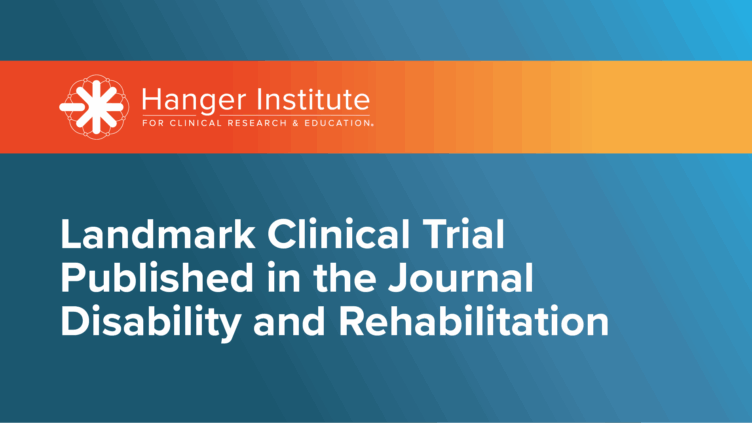
AUSTIN, TX- August 8, 2025- Today Hanger Clinic and Ottobock announced the publication of a landmark clinical randomized controlled trial ASsessing Clinical outcomes with microprocEssor kNee uTilization in a K2 population (ASCENT K2), in the journal Disability and Rehabilitation. The results of the study demonstrated that microprocessor knees (MPKs) significantly reduce falls and afford a better quality of life for individuals with above-knee amputations classified as limited community ambulators (Medicare K2 level).
Led by researchers from the Hanger Institute for Clinical Research and Education and Ottobock, working with collaborators from the University of Washington and University of Illinois Chicago, the study followed over 100 participants across the U.S., half of them prospectively randomized to be fitted with an MPK (Ottobock Kenevo) while the other half randomized to continued use of a non-microprocessor knee (NMPK) during a 12-month period. Results showed that individuals using MPKs experienced significantly fewer falls and near-falls, and reported less activity avoidance due to fear of falling, compared to those using NMPKs. Participants in the MPK group also maintained their health-related quality of life, while those in the NMPK group experienced a significant decline.
“These results challenge outdated assumptions about who benefits from innovative prosthetic care,” said co-principal investigator Dr. Shane Wurdeman, Hanger Clinic’s Chief Clinical Officer. “Individuals that are of a lower functional ability can achieve meaningful improvements in safety, confidence, and quality of life with access to MPKs.”
“The ASCENT K2 study confirms what many clinicians have long observed in practice: access to microprocessor knee technology can dramatically reduce fall risk and preserve independence and quality of life, even for individuals with low mobility,” said Dr. Andreas Kannenberg, co-principal investigator and Executive Medical Director for Ottobock North America. “These findings should serve as a catalyst for policy change with commercial health insurances, ensuring all K2 patients, regardless of age or mobility within the K2 functional level, have access to prosthetic solutions that support both safety and quality of life.”
The randomized, controlled trial adds to the body of evidence supporting broader access to MPKs for older adults and individuals with lower mobility classifications. Findings support recent changes to Medicare coverage guidelines and underscore the need to re-evaluate current coverage policies across all third-party payers that restrict MPK access based solely on functional level.
About Hanger, Inc. – Headquartered in Austin, Texas, Hanger, Inc. is a leading provider of orthotic and prosthetic (O&P) patient care services and products. The company operates as an ecosystem of diversified companies delivering complementary solutions to individuals and providers with O&P needs, and is organized in two business segments – Patient Care and Products & Services. Through its Patient Care segment, Hanger provides comprehensive, outcomes-based O&P services to individuals of all ages at more than 925 Hanger Clinic locations nationwide. Through its Products & Services segment, Hanger serves the broader O&P community and skilled nursing facilities through designing and distributing branded and private label O&P devices, products and components, providing consulting services, and offering post-acute rehabilitative solutions. Rooted in clinical research, excellence, and innovation, Hanger is a purpose-driven company focused on empowering human potential. For more information, visit corporate.hanger.com.
Contact:
Annie Myers
External Relations Manager
(210) 440-7380 or [email protected]
